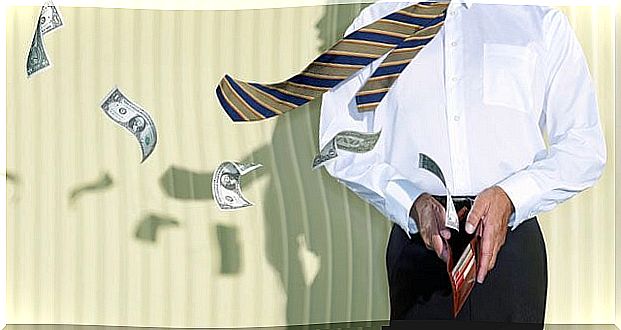When Your Feelings Make You Lose Money

Some actions, such as losing or making money, are strongly linked to a person’s emotions. For the most part, money is not earned or wasted for objective reasons. In other words, one could say that money is a symbolic object. As such , your mind creates different sentences for it and different ways of dealing with it. Always with the proviso that it is practically a universal form of barter.
What makes you earn or lose money depends on the decisions you make. It goes further than having a lot or a little money. What defines you is the way you manage your wealth. Wealth has reached fetish status because we live in a world that has slowly turned into one of the objects to be bought and sold.
Many people have psychological scars from lack of resources as well as emotional rejection. Perhaps their parents had to leave them alone to earn a living. It may also be that at some point they felt embarrassed about their lack of resources. In these specific cases , money is a complex problem that often leads to other problems.
“A dog with money would be called Mr. Dog.”
-Arabic proverb-

Emotions and money: losing money and pretending
One factor that can make you lose money is if you hate your life. You are convinced that a lack of financial resources is the reason for the dissatisfaction in your life. So you believe in the illusion that your value would increase if you had more money.
Therefore, you associate money with satisfaction. You will be unable to imagine enjoyable situations without spending. Because your resources are limited , dissatisfaction becomes a way of life.
Many times you “solve” the problem by pretending to have money. You feel a strong attraction to status symbols. You lose money by spending it on unnecessary items or badges. Your goal is to experience “how it feels to have a lot of money” and to feel whole and fulfilled… at least for a little while.
Emotions and money: losing money to fill a void
This situation is similar to the previous one. The difference is that in this case, your frustration leads to impulsive and compulsive behavior. People in this category can not stand to see a product on sale without buying it. Collectors of unnecessary items are governed by the need to continue buying things.
They are unaware that they are actually trying to satisfy other, deeper-lying, shortcomings. But because they are not aware of this, they seem like bottomless barrels. Their appetite for new things is insatiable. Supermarkets love this type of consumer and help them spend their money with little tricks. They bombard these individuals with advertising and non-existent sales.
In fact, they raise the price artificially and then lower it to the normal price and make it seem like a cape. They make it easy to buy more and more and more. In the end, these consumers may be able to pay their bills, but they end up feeling empty. And so the vicious circle begins again.

The return of imperfection
There are many unconscious factors involved in managing money. Today , concepts of happiness are very closely linked to consumerism. The illusion is that money has the power to repair a person’s low self-esteem. It is said to be able to guarantee meaning to a life that seems scary.
Therefore, loss of money seems to be a consequence of giving them a leading role in your life. Paradoxically, a disproportionate desire to be rich leads to a loss of wealth. The difference between the real value of money and the meaning stamped on it leads to capricious and unintelligent actions. Money and consumption are used as means to solve difficulties on another level.
Financial problems are the last area where you want to involve your emotions. When dealing with confused, neurotic emotions, the danger is even greater. The problem is that the victims of this logic do not understand their difficult situation.
Therefore , the loss of money appears to be a recurring normal event. It reinforces their dissatisfaction and causes internal shortcomings that are re-experienced with enhanced strength.
Finally, the gain or loss of money is merely a smokescreen. Maybe the financial resources deep down are not the real problem. Maybe the problem is your unfulfilled desire that is only growing because money cannot satisfy that very need.
Instead, it is precisely this void that maintains the unfulfilled desire. You get money but it does not help you; the fact is that it only increases self-deception, it hides difficulties and inconveniences that you refuse to deal with.








